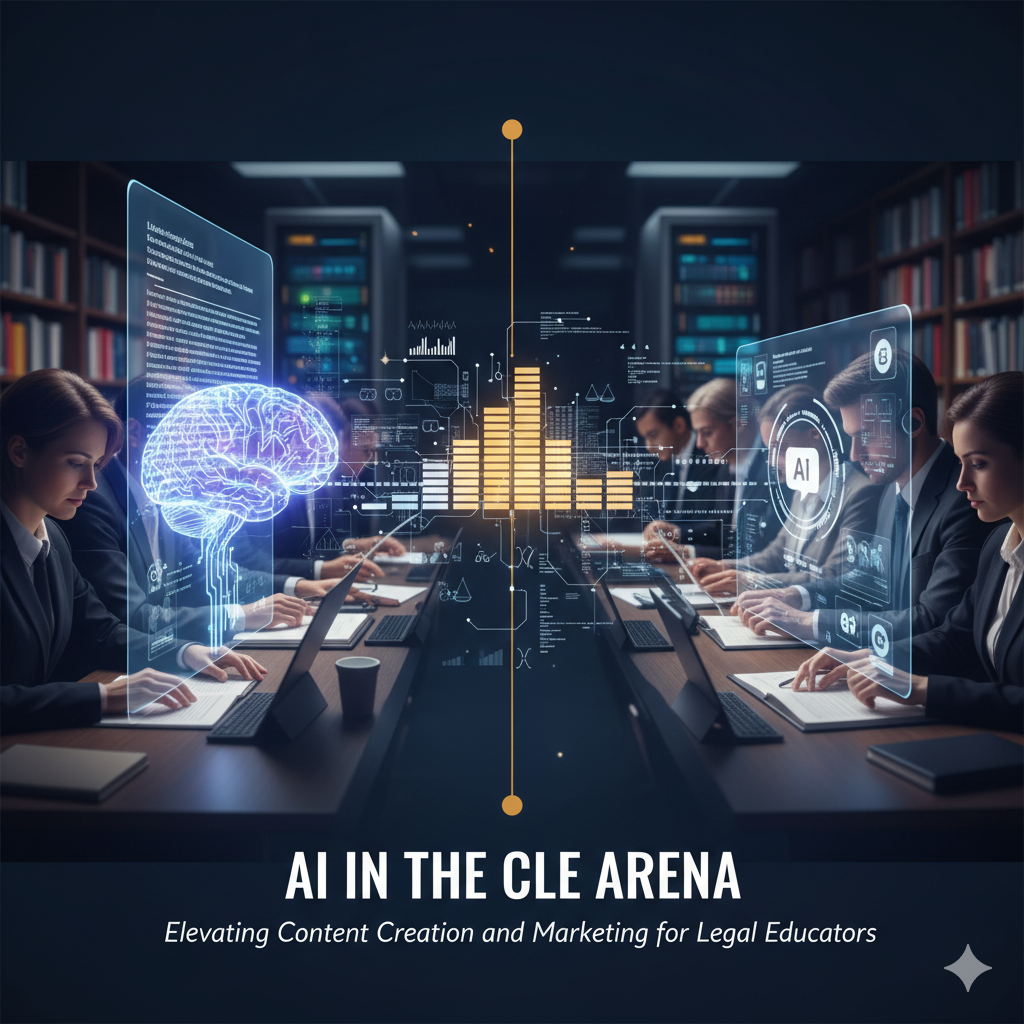By Mark Rosch
For US-based Continuing Legal Education (CLE) providers, the integration of Artificial Intelligence (AI) is a rapidly evolving toolkit that promises to revolutionize how we create, deliver, and market our essential continuing legal educational offerings. From automating tedious tasks to personalizing the learning experience, AI presents a powerful opportunity to enhance efficiency, engagement, and ultimately, our reach within the legal community.

Here’s how CLE providers can leverage AI to stay ahead:
1. Content Generation & Augmentation: Beyond the Blank Page
The most immediate application of AI lies in its ability to assist with content creation, turning legal expertise into compelling educational modules more quickly and efficiently.
-
Drafting & Outlining: AI tools can rapidly generate initial drafts of course descriptions, learning objectives, and even module outlines based on a topic prompt. Imagine providing AI with "recent Supreme Court decision on administrative law" and receiving a structured outline for a 60-minute CLE, complete with key takeaways and potential discussion points. This isn't about replacing legal expertise, but jumpstarting the drafting process, freeing up attorneys to focus on the nuanced legal perspectives that can be included in the course.
-
Summarization & Extraction: AI can quickly digest lengthy legal documents, recent case law, or legislative updates, and extract key points relevant to a CLE topic. This allows expert presenters to rapidly grasp the essence of complex material, ensuring their content is current and concise.
-
Case Study and Hypothetical Scenario Creation: Need a realistic hypothetical for a ethics course? AI can generate detailed, contextually relevant scenarios based on specified parameters, offering diverse and engaging examples for learners. This can also eliminate the potential ethical pitfall of presenters using (potentially) identifiable facts about their clients in their presenations.
-
Question Bank Development: AI can generate multiple-choice questions, true/false statements, and short-answer prompts tailored to specific learning objectives, significantly reducing the time required to build robust assessment tools for courses.
2. Personalized Learning Experiences: The Future of Legal Education
One of AI's most exciting potentials is its ability to tailor the learning journey for individual attorneys, making CLE more relevant and impactful for individual attendees.
-
Adaptive Learning Paths: Imagine an AI recommending specific modules to a lawyer based on their practice area, prior course history, and identified knowledge gaps. Instead of a one-size-fits-all approach, AI can curate personalized learning pathways, ensuring attorneys get the most relevant education for their professional development.
-
Intelligent Q&A Bots: For on-demand courses, an AI-powered chatbot could answer frequently asked questions about the course material or legal concepts, providing instant support. This could reduce the burden on volunteer human instructors, leaving more interesting, complex queries for them to answer.
-
Feedback and Remediation: AI can analyze learner performance on quizzes and exercises. This can help identify areas of weakness and suggest supplementary materials or topics for review. This targeted remediation can enhance attendee comprehension and retention.
3. Marketing & Distribution: Reaching the Right Attorneys
Beyond content, AI offers unparalleled capabilities in understanding our audience and optimizing our marketing efforts.
-
Audience Segmentation & Targeting: AI algorithms can analyze registration data, website interactions, and demographic information to identify distinct segments within our legal audience. This allows for highly targeted marketing campaigns, promoting relevant CLE courses to the attorneys most likely to benefit.
-
Predictive Analytics: AI can forecast demand for certain CLE topics based on current legal trends, legislative changes, and attorney interest. This allows us to proactively develop content for emerging areas of law, ensuring timely and in-demand courses.
-
Automated Content Promotion: AI tools can optimize social media posts, email subject lines, and ad copy for maximum engagement. They can also schedule posts at optimal times and identify the best platforms to reach specific attorney demographics.
-
Search Engine Optimization (SEO) Enhancement: AI can identify keywords and phrases that legal professionals use when searching for CLE, helping us optimize our course titles, descriptions, and website content to rank higher in search results.
-
Personalized Marketing Communications: Instead of generic email blasts, AI can craft personalized email recommendations for courses based on an attorney's past registration history, browsing behavior, and stated preferences, dramatically increasing conversion rates.
4. Operational Efficiencies: Streamlining the Back Office
AI can also tackle the administrative burdens that often consume valuable resources.
-
Speaker & Topic Matching: For those of us running large CLE programs, AI can analyze attorney expertise, availability, and past presentation topics to suggest optimal speaker-to-topic pairings, ensuring the best content delivery.
-
Administrative Task Automation: In the absence of a dedicated Learning Management System (LMS), AI can automate tasks like sending reminder emails, generating certificates of completion, and updating attorney credit hours, freeing up our team for more strategic initiatives.
-
Transcription and Captioning: AI-powered transcription services can rapidly convert audio from webinars and in-person seminars into text, making content accessible to a wider audience and providing source material for written summaries or articles. Transcripts can also be used to close-caption video content to make it more accessible to the hearing impaired.
Integrating AI into CLE production and marketing isn't just about adopting new technology; it's about reimagining how we serve the legal community. By embracing these tools, we can create more engaging, personalized, and impactful educational experiences, ensuring attorneys remain sharp, compliant, and at the forefront of their practice.
The future of CLE is intelligent, and it's here now.
THE LATEST INTERNET RESEARCH TIPS
Read the latest strategies, tips and new resources available for integrating the Internet into your law practice in our newsletter.
